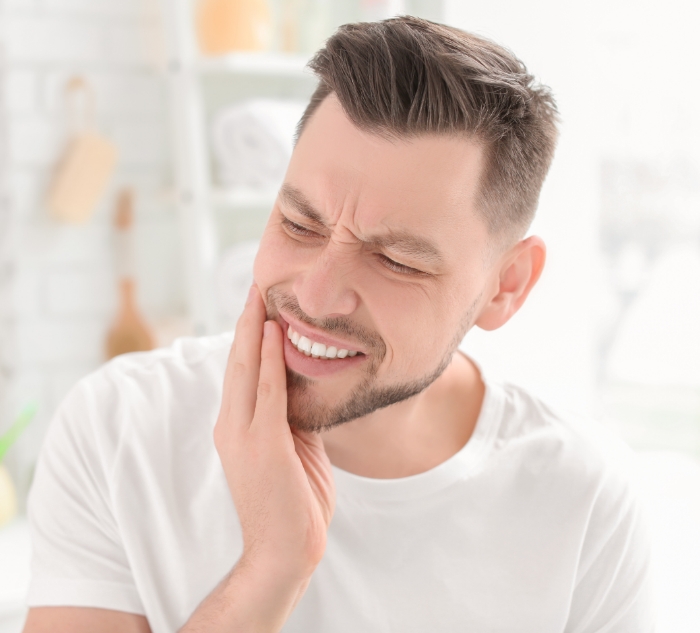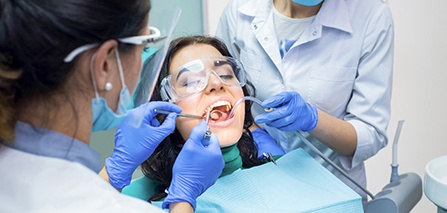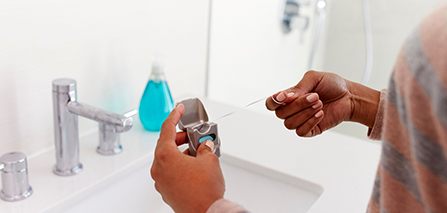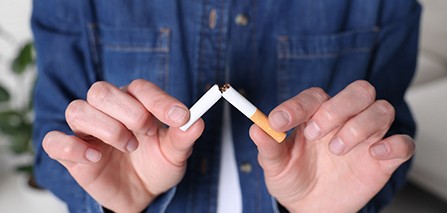Emergency Dentist Putnam
We’re Here to Deliver Immediate Care When You Need It

They say that an ounce of prevention is worth a pound of cure. While you may be unable to predict and even prevent some dental emergencies, you can have a plan in place to avoid possible panic. At Unique Dental of Putnam, we want you to know that you can call on us for help when dealing with a dental injury. Offering same-day and Saturday appointments, our Putnam emergency dentists can provide immediate care when you need it most. Just call our office to inquire about the steps you should take when faced with a serious dental emergency.
Why Choose Unique Dental of Putnam for Emergency Dentistry?
- Same-Day & Saturday Appointments Available
- State-of-the-Art Technology for Added Comfort & Precision
- We Will Maximize Your Dental Insurance Benefits
How We Treat Dental Emergencies

Treating a dental emergency requires several steps. First, you must call our office to discuss your injury. Based on the information you provide, we will work to schedule an appointment for you to come in as soon as possible. The moment you arrive, we’ll escort you to a treatment room, where we’ll take images of your teeth and gums, pinpoint the problem area, and craft a personalized treatment plan for you to review. We want to help you out of pain quickly, so we will start the process of fixing your dental injury so that you experience no additional discomfort and walk away from your visit with a fully repaired and restored smile.
The Most Common Dental Emergencies
No matter the type of dental emergency, it’s important that you seek our professional help. We can determine the severity and make recommendations to ensure your smile remains in optimal shape moving forward. In the meantime, feel free to review some of the most common dental emergencies we treat and how you can manage the symptoms at home.
Understanding the Cost of Dental Emergencies

If you are expecting a set price for your dental emergency appointment and treatment, you will be disappointed. The reason is that it is impossible to determine how much you will pay without a thorough examination. This is why you should get in to see our team right away. Forgoing proper care will only cause your injury to worsen, leading to more time-consuming and costlier procedures. However, by allowing our team to evaluate your case, we will not only provide timely treatment but also work with your dental insurance company to ensure you pay the lowest possible price.
Keys to Preventing Dental Emergencies

We know that it is impossible to prevent all types of dental emergencies. However, we do believe that you can minimize your risk if you take the appropriate steps. Here are a few examples:
Visit Your Dentist Every Six Months

Has it been more than six months since your last dental checkup and teeth cleaning? If so, now is the time to get your next appointment on the calendar! These routine visits to our Putnam dental office allow us to complete an oral cancer screening as well as check for warning signs of oral health problems, like tooth decay. If we find anything concerning, we can intervene right away – hopefully before a same-day visit to our office is needed because of a painful dental injury.
Adopt a Solid At-Home Oral Hygiene Regimen

If food particles and other debris are left on your teeth and gums, your risk of tooth decay and gum disease skyrocket. That’s why it’s so important to take good care of your smile at home! First, use a soft-bristled toothbrush and fluoridated toothpaste to brush your teeth each morning and evening. Second, floss daily to clean along your gumline and between your teeth. Third, rinse with an antimicrobial mouthwash for 30-60 seconds each day.
Eat Lots of Nutrient-Dense Foods

Carrots, apples, and celery are not only nutrient-dense, but they are also quite crunchy, which helps remove plaque, food particles, and other debris from your teeth. That’s why we strongly recommend filling your plate with fresh fruits, raw vegetables, lean proteins, and healthy fats instead of foods and drinks that are packed with added sugar. Simply put, what you eat matters, so do your best to adopt a well-balanced, nutrient-dense diet for the sake of your oral and overall health!
Protect Your Teeth During Sports

Some sports, like football, require participants to wear a mouthguard. This is important because all it takes is one rogue ball or accidental elbow to the face to wind up with a serious dental injury. However, it’s important to wear the proper protection during non-contact sports as well, including running, skateboarding, and rollerblading. That way, there’s a significantly lower risk of your teeth and gums getting damaged in the process.
Give Up Unhealthy Dental Habits

Smoking is one unhealthy habit that can wreak havoc on your smile. However, it’s not the only one. Using your teeth to tear into plastic wrapping, bite your nails, chew on ice, or hold your keys can also lead to serious damage. So, we strongly recommend steering clear of these habits entirely.
Dental Emergency FAQs
Should I Visit the Emergency Room First for Dental Emergencies?
While there are exceptions to the rule, you should try to visit your dentist first in most situations. Emergency rooms are hardly ever equipped or staffed with the correct equipment and personnel to handle dental issues. The only exceptions are jaw fractures and dislocation, serious cuts to the face or mouth that won’t stop bleeding, and abscesses that have swollen to restrict breathing or swallowing. At Unique Dental of Putnam, we offer same-day and Saturday emergency appointments, so you won’t have to wait if your crisis occurs during those hours.
Will My Toothache Go Away on Its Own?
If you have a toothache, it’s best to call ahead and schedule an appointment. There are several reasons why your tooth could be in pain and all of them require treatment. If the pain subsides on its own, it could indicate that an infection is spreading and killing the nerves of the tooth. As a rule, tooth pain doesn’t go away on its own without a reason because teeth are incapable of healing themselves. So, having your mouth checked by Dr. Moaz or Dr. Zakhem is the best and safest option when it comes to throbbing tooth pain and could save you from requiring more costly treatment.
Should Knocked-Out Teeth Be Placed in Water?
No. It can be used to gently rinse a knocked-out tooth if it’s dirty, but it shouldn’t be transported in water. The chemical makeup of water (especially tap water) can kill the connective tissues still attached to the root after too long. Instead, try to gently place it back into the socket if possible. Otherwise, you can use milk or a saline solution for up to an hour. You can also carry it in your cheek or store it with an emergency tooth preservation kit like Save-a-Tooth®. Remember, your tooth’s odds of being reimplanted successfully go down after around 30 minutes, so try to store it properly and see us fast!
Can I Pop a Dental Abscess on My Own?
While it may be tempting to lance a dental abscess at home, especially if it's in pain, this is never a good idea. Abscesses form when your body is attempting to kill an infection near your tooth. White blood cells rush to the area to fight it off, and the resulting pus must evacuate. Often this occurs through the gums or other soft tissues surrounding the affected area. This causes a swollen, bacteria-infested mass that could turn deadly if not handled properly. If you see a zit-like bump form on your gums or cheek, give us a call immediately.
I Need a Checkup & Cleaning I am Worried About Gum Disease I Have a Cavity or Broken Tooth I am Missing One or More Teeth I Want to Enhance My Smile I Want a Straighter Smile View Our Services
